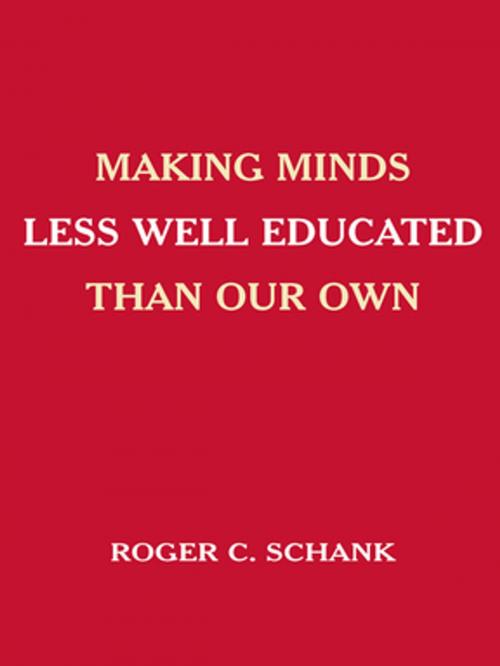Making Minds Less Well Educated Than Our Own
Nonfiction, Reference & Language, Education & Teaching, Educational Theory, Curricula, Aims & Objectives| Author: | Roger C. Schank | ISBN: | 9781135615109 |
| Publisher: | Taylor and Francis | Publication: | August 21, 2012 |
| Imprint: | Routledge | Language: | English |
| Author: | Roger C. Schank |
| ISBN: | 9781135615109 |
| Publisher: | Taylor and Francis |
| Publication: | August 21, 2012 |
| Imprint: | Routledge |
| Language: | English |
In the author's words: "This book is an honest attempt to understand what it means to be educated in today's world." His argument is this: No matter how important science and technology seem to industry or government or indeed to the daily life of people, as a society we believe that those educated in literature, history, and other humanities are in some way better informed, more knowing, and somehow more worthy of the descriptor "well educated." This 19th-century conception of the educated mind weighs heavily on our notions on how we educate our young. When we focus on intellectual and scholarly issues in high school as opposed to issues, such as communications, basic psychology, or child raising, we are continuing to rely on outdated notions of the educated mind that come from elitist notions of who is to be educated and what that means. To accommodate the realities of today's world it is necessary to change these elitist notions. We need to rethink what it means to be educated and begin to focus on a new conception of the very idea of education. Students need to learn how to think, not how to accomplish tasks, such as passing standardized tests and reciting rote facts.
In this engaging book, Roger C. Schank sets forth the premises of his argument, cites its foundations in the Great Books themselves, and illustrates it with examples from an experimental curriculum that has been used in graduate schools and with K-12 students.
Making Minds Less Well Educated Than Our Own is essential reading for scholars and students in the learning sciences, instructional design, curriculum theory and planning, educational policy, school reform, philosophy of education, higher education, and anyone interested in what it means to be educated in today's world.
In the author's words: "This book is an honest attempt to understand what it means to be educated in today's world." His argument is this: No matter how important science and technology seem to industry or government or indeed to the daily life of people, as a society we believe that those educated in literature, history, and other humanities are in some way better informed, more knowing, and somehow more worthy of the descriptor "well educated." This 19th-century conception of the educated mind weighs heavily on our notions on how we educate our young. When we focus on intellectual and scholarly issues in high school as opposed to issues, such as communications, basic psychology, or child raising, we are continuing to rely on outdated notions of the educated mind that come from elitist notions of who is to be educated and what that means. To accommodate the realities of today's world it is necessary to change these elitist notions. We need to rethink what it means to be educated and begin to focus on a new conception of the very idea of education. Students need to learn how to think, not how to accomplish tasks, such as passing standardized tests and reciting rote facts.
In this engaging book, Roger C. Schank sets forth the premises of his argument, cites its foundations in the Great Books themselves, and illustrates it with examples from an experimental curriculum that has been used in graduate schools and with K-12 students.
Making Minds Less Well Educated Than Our Own is essential reading for scholars and students in the learning sciences, instructional design, curriculum theory and planning, educational policy, school reform, philosophy of education, higher education, and anyone interested in what it means to be educated in today's world.















